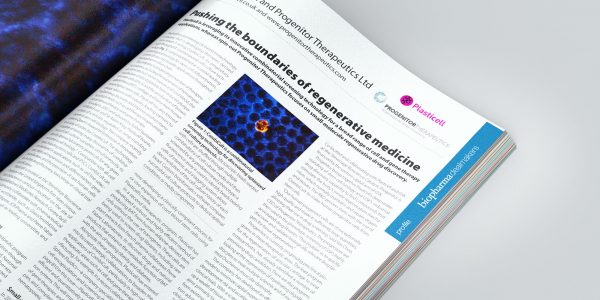Plasticell is leveraging its innovative combinatorial screening technology for a broad range of cell and gene therapy applications, whereas spin-out Progenitor Therapeutics focuses on small-molecule regenerative drug discovery.
Plasticell is a pioneering UK-based biotechnology company that is developing therapies derived from research using CombiCult, its proprietary high-throughput combinatorial cell culture technology (Fig. 1). Long established as a world-leading screening technology for stem cell differentiation, CombiCult also has broader applications throughout the biopharma value chain.
The company is progressing a number of therapeutic programs, including the expansion of hematopoietic stem cells from bone marrow and cord blood, the manufacture of blood platelets from induced pluripotent stem cells (iPSCs) and the production of brown adipose tissue (BAT), cartilage and bone from human mesenchymal stem cells. Plasticell has also formed strategic alliances with industry-leading partners to facilitate drug discovery and improve product manufacturing in fields such as cell therapy bioprocessing, cancer immunotherapy and gene therapy.
Founded in 2002 and advised by Nobel laureates Sir Martin Evans and Sir Aaron Klug, Plasticell boasts a team of scientists regarded as long-standing experts in stem cell biology. The company recently added a Queen’s Award for Enterprise in Innovation to an array of prizes for CombiCult. The technology is capable of testing many thousands of combinations of cell culture variables simultaneously to identify optimal laboratory protocols for any given outcome in cell biology1. Compatible with all cell types, including stem cells and iPSCs, CombiCult can be deployed in applications such as cell line selection; stem cell expansion and differentiation; gene transduction; and the provision of rare human cells for in vitro drug discovery, toxicology or clinical trial stratification.
Plasticell is located at the Stevenage Bioscience Catalyst—the United Kingdom’s first open innovation bioscience campus—located on the site of GlaxoSmithKline’s Medicines Research Centre facility. The company collaborates with pharmaceutical companies worldwide, such as GlaxoSmithKline (GSK), Merck-Millipore, JCR Pharma and Pierre Fabre Laboratories, as well as leading universities and research organizations.
Cell and gene therapies
Plasticell is progressing its lead therapeutic program for hematopoietic stem cell transplantation through collaborations with the University of Oxford, National Health Service and the Cell and Gene Therapy Catapult. Using CombiCult, Plasticell has tested
combinations of cell culture components to develop highly effective cord blood expansion media, which amplify hematopoietic stem cells by up to 500-fold.
With support from Innovate UK, the consortium is now developing a clinically compliant process for ex vivo expansion of cord blood stem cells using Plasticell’s media.
In a second therapeutic program, Plasticell has developed a robust and highly efficient method of producing BAT from human-adipose-derived stem cells without the use of transgenes. These cells are being used to screen drug libraries, including rare plant extracts from French pharma collaborator Pierre Fabre Laboratories, to discover drugs and natural products that enhance the metabolic function of BAT
with the aim of treating obesity and diabetes.
Alongside these programs, Plasticell has entered into focused strategic collaborations to broaden the applications of CombiCult, particularly in high-value therapeutic areas such as cell and gene therapy manufacturing. For example, in a recent collaboration with
Sphere Fluidics—a company specializing in singlecell encapsulation and screening that is profiled on page B10 in this issue—Plasticell is developing highly efficient and quantitatively accurate gene transduction systems. This will improve the efficacy and safety of gene therapies and future cancer immunotherapies, and complements Plasticell’s current efforts in hematopoietic stem cell expansion.
Small-molecule regenerative drugs
In 2013, Plasticell spun out Progenitor Therapeutics to focus on discovery and development of drugs to regenerate specific tissues of the human body.
Co-located and collaborating with Plasticell and GSK at the Stevenage Bioscience Catalyst, Progenitor is financed by the venture capital arm of GSK.
Progenitor brings together Plasticell’s deep understanding of stem cell biology and GSK’s industrial drug discovery capability to find compounds that stimulate the body’s innate regeneration mechanism, which normally maintains and repairs organs and tissues. The R&D process starts with the use of CombiCult to make human progenitor cells from stem cells.
“Our human progenitor cells are of exceptionally high quality and made in sufficiently large quantities, allowing their use in drug screening,” said Yen Choo, CEO of Progenitor Therapeutics. The progenitors are then used in the phenotypic screening of GSK’s highly annotated drug libraries. “This enables us to quickly discover and validate biologically relevant drug targets for tissue regeneration.”
Progenitor is currently progressing preclinical programs in three therapeutic areas. The lead program, for the regeneration of articular cartilage to treat osteoarthritis, has already identified a number of promising drug candidates. There are also programs looking at the regeneration of myelinating oligodendrocytes to treat multiple sclerosis and of muscle to treat Duchenne muscular dystrophy.
The company has developed an efficient business model to minimize capital expenditure, reduce drug development risk and accelerate timelines to human clinical trials. With a screening capability that turns up a wealth of tissue-regeneration targets, Progenitor aims primarily to exploit those targets that benefit from existing medicinal chemistry efforts to reposition advanced drug assets to progress rapidly to clinical trials.
“With an accelerated scientific and business plan, we welcome early partnering discussions around our small-molecule regenerative drug programs,” said Choo. “The results of our discovery effort support our view that our lead program can proceed to clinical trials within two years.”
- Tarunina, M. et al. PLoS One 9, e104301 (2014).
Source: biopharmadealmakers.nature.com

